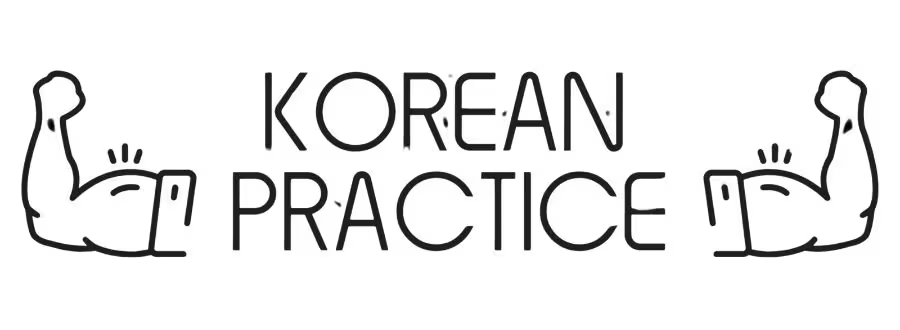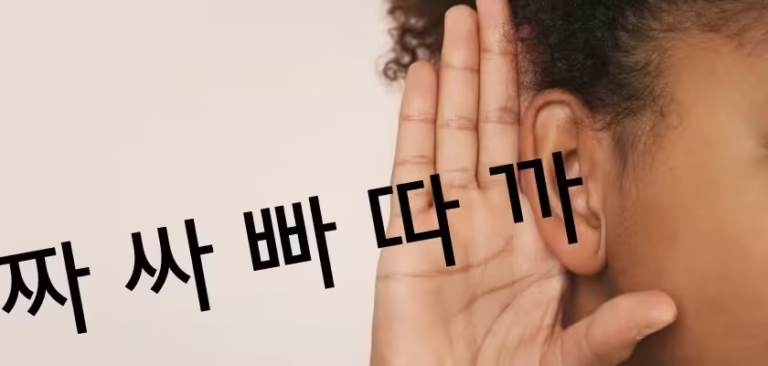Table of Contents
Understanding the Basics of Korean Verbs
What Are Korean Verbs?
In Korean, verbs are action words just like in English, but they play a more central role in forming sentences. Every Korean sentence must end with a verb, making it the focus of the
sentence’s meaning.
Structure of Korean Verbs
Korean verbs consist of a verb stem (the base form) and different endings. For example, the verb for “to eat” is 먹다 (meok-da). The stem is 먹 (meok), and the ending 다 (da) is the dictionary form.
Shall we start studying Korean very easily using the Korean verbs list? Let’s go!
The Most Common Korean Verbs List
Basic Action Verbs List
In the Common Korean Verbs List, the first action verb is 하다 (ha-da) – to do

Example
Original Korean Sentence
나는 매일 아침 운동을 해요.
Pronunciation Guide
나는 (na-neun) 매일 (mae-il) 아침 (a-chim) 운동을 (un-dong-eul) 해요 (hae-yo).
Meaning and Context
나 (I) 는 (I am going to talk about me) 매일 (everyday) 아침 (morning) 운동 (exercise) 을 (my object is excercise) 하 (to do) 해요 (I’m telling you polite and friendly).
Pronunciation Patterns for Conjugations
⊳ 하 changes to 해
English Translation
I exercise every morning.
Literal Translation
I do exercise everyday morning.
In the Common Korean Verbs List, the second action verb is 가다 (ga-da) – to go
Example
Original Korean Sentence
나는 어제 우체국에 갔어요.
Pronunciation Guide
나는 (na-neun) 어제 (eo-je) 우체구게 (u-che-gu-ge) 갓써요 (gat-sseo-yo).
Meaning and Context
나 (I) 는 (my topic is myself) 어제 (yesterday) 우체국 (post office) 에 (to) 가 (to go) 았 (past tense) 어요 (I’m telling you polite and friendly).
Pronunciation Patterns for Conjugations
⊳ 가 + 았 = 갔
When rapidly pronounced, ‘가’ and ‘았’ naturally combine to form ‘갔’.
English Translation
I went to the post office yesterday.
Literal Translation
I went to post office yesterday.

Want to learn Korean in a simple and structured way, just like this? My courses break down grammar step by step, making Korean easy to understand. Plus, you can try free sample lessons. Ready to start?
In the Common Korean Verbs List, the third action verb is 오다 (o-da) – to come
Example
Original Korean Sentence
강아지가 나에게 오고 있어요.
Pronunciation Guide
강아지가 (gang-a-ji-ga) 나에게 (na-e-ge) 오고 (o-go) 잇써요 (it-sseo-yo).
Meaning and Context
강아지 (puppy) 가 (I’m going to talk about the puppy) 나 (me) 에게 (to) 오 (to come) 고 있 (~ing) 어요 (is; I’m telling you polite and friendly).
English Translation
The puppy is coming to me.
Literal Translation
Puppy is coming to me.
In the Common Korean Verbs List, the fourth action verb is 먹다 (meok-da) – to eat
Example
Original Korean Sentence
오늘 밤에 피자 먹자.
Pronunciation Guide
오늘 (o-neul) 빠메 (bba-me) 피자 (pi-ja) 먹짜 (meok-jja).
Meaning and Context
오늘 (today) 밤 (night) 에 (at) 피자 (pizza) 먹 (to eat) 자 (let’s; in a casual way).
English Translation
Let’s eat pizza tonight.
Literal Translation
Let’s eat pizza at today night.
In the Common Korean Verbs List, the fifth action verb is 마시다 (ma-si-da) – to drink
Example
Original Korean Sentence
사과 쥬스를 마시고 싶어.
Pronunciation Guide
사과 (sa-gwa) 쥬스를 (jyu-seu-reul) 마시고 (ma-si-go) 시퍼 (si-peo).
Meaning and Context
사과 (apple) 쥬스 (juice) 를 (my object is apple juice) 마시 (to drink) 고 싶 (want to) 어 (I’m telling you casually).
English Translation
I want to drink apple juice.
Literal Translation
(I) want to drink apple juice.
Emotional and Sensory Korean Verbs List
In the Common Korean Verbs List, the first emotional and sensory Korean verb is 좋아하다 (jo-a-ha-da) – to like
Example
Original Korean Sentence
나는 고기를 좋아해요.
Pronunciation Guide
나는 (na-neun) 고기를 (go-gi-reul) 조아해요 (jo-a-hae-yo).
Meaning and Context
나 (I) 는 (I’m going to talk about me) 고기 (meat) 를 (my object is meat) 좋아하 (to like) 해요 (I’m telling you polite and friendly).
Pronunciation Patterns for Conjugations
⊳ 하 changes to 해
English Translation
I like meat.
In the Common Korean Verbs List, the second emotional and sensory Korean verb is 사랑하다 (sa-rang-ha-da) – to love
Example
Original Korean Sentence
당신을 영원히 사랑해요.
Pronunciation Guide
당시늘 (dang-si-neul) 영원히 (yeong-won-hi) 사랑해요 (sa-rang-hae-yo).
Meaning and Context
당신 (you; in a romantic settings) 을 (my object is you) 영원히 (forever) 사랑하 (to love) 해요 (I’m telling you polite and friendly).
Pronunciation Patterns for Conjugations
⊳ 하 changes to 해
English Translation
I love you forever.
Literal Translation
(I) love you forever.
In the Common Korean Verbs List, the third emotional and sensory Korean verb is 싫어하다 (si-reo-ha-da) – to dislike
Example
Original Korean Sentence
나는 벌레를 싫어해요.
Pronunciation Guide
나는 (na-neun) 벌레를 (beol-re-reul) 시러해요 (si-reo-hae-yo).
Meaning and Context
나 (I) 는 (my topic is myself) 벌레 (bug) 를 (my object is bugs) 싫어하 (to dislike) 해요 (I’m telling you polite and friendly).
Pronunciation Patterns for Conjugations
⊳ 하 changes to 해
English Translation
I hate bugs.
Literal Translation
I hate bug.
In the Common Korean Verbs List, the fourth emotional and sensory Korean verb is 보다 (bo-da) – to see
Example
Original Korean Sentence
우리는 같이 영화를 봤어요.
Pronunciation Guide
우리는 (u-ri-neun) 가치 (ga-chi) 영화를 (yeong-hwa-reul) 봣써요 (bwat-sseo-yo).
Meaning and Context
우리 (we) 는 (our topic is ourself) 같이 (together) 영화 (movie) 를 (my object is a movie) 보 (to watch) 았 (past tense) 어요 (I’m telling you polite and friendly).
Pronunciation Patterns for Conjugations
⊳ 보 + 았 = 봤
When rapidly pronounced, ‘보’ and ‘았’ naturally combine to form ‘봤’.
English Translation
We watched a movie together.
Literal Translation
We watched movie together.
Auxiliary Korean Verbs List
In the Common Korean Verbs List, the first auxiliary Korean verb is 있다 (it-da) – to exist/to have
Example
Original Korean Sentence
나는 오늘 수업이 있어요.
Pronunciation Guide
나는 (na-neun) 오늘 (o-neul) 수어비 (su-eo-bi) 잇써요 (it-sseo-yo).
Meaning and Context
나 (I) 는 (my topic is myself) 오늘 (today) 수업 (class) 이 (my subject is class) 있 (to have) 어요 (I’m telling you polite and friendly).
English Translation
I have class today.
In the Common Korean Verbs List, the first auxiliary Korean verb is 없다 (eop-da) – to not exist/to not have
Example
Original Korean Sentence
나는 시간이 없어요.
Pronunciation Guide
나는 (na-neun) 시가니 (si-ga-ni) 업써요 (eop-sseo-yo).
Meaning and Context
나 (I) 는 (I’m going to talk about me) 시간 (time) 이 (my subject is time) 없 (don’t) 어요 (I’m telling you polite and friendly).
English Translation
I don’t have time.
Conclusion: Common Korean Verbs List
Mastering Korean verbs is essential for fluency in the language. By starting with the basics, practicing regularly, and learning the different tenses and politeness levels, you’ll be well on your way to becoming confident in speaking Korean. Keep practicing, and soon enough, you’ll find yourself using these Korean verbs list naturally!
Sign up for my newsletter and get
📖 Korean short stories
🎧 Listening practice with audio
❓ Vocabulary and grammar quizzes
🎁 Free courses
📝 Blog updates
– all delivered straight to your inbox!










